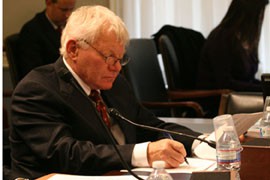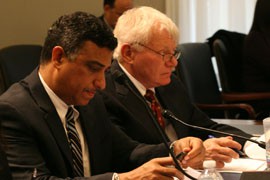Cronkite News has moved to a new home at cronkitenews.azpbs.org. Use this site to search archives from 2011 to May 2015. You can search the new site for current stories.
Tribes back bill to ease federal oversight of Indian-land energy projects
WASHINGTON – Tribal officials told a House committee Wednesday that federal regulation of energy projects on Indian lands is a “major bottleneck” that is stifling their economies and needs to be changed.
Representatives from a half-dozen tribes spoke to a House Natural Resources subcommittee in support of the Native American Energy Act, which would expand tribal authority over energy development projects and relax some federal rules.
“This is all very critical to the (Navajo) nation’s overall energy self-sufficiency and the economic development of the nation,” said Wilson Groen, president and CEO of the Navajo Nation Oil & Gas Co.
James Olguin, vice chairman of the Southern Ute Indian Tribal Council, called the current federal process a “major bottleneck” to Native American commerce. He said the bill would remove competitive disadvantages and “level the playing field” for tribes in energy development.
“As we have stated repeatedly, ‘We are the best protectors of our own resources and the best stewards of our own destiny, provided that we have the tools to use what is ours,’” Olguin said in his prepared testimony.
Among its provisions, the bill would limit Bureau of Land Management fee collections on some Native projects, set up energy development offices across Indian country and require a bond be posted by anyone who wants to challenge an energy project.
The bill would also let tribes conduct their own reviews of energy development agreements, which is currently done by the Interior Department. Reviews would be automatically approved if the department failed to act on them within 30 days.
Groen said that it currently takes about 1.5 years to get a drilling permit in the Navajo Nation, with others citing times from a year to two years or more. Supporters said they hope the bill can cut that time and improve economic dividends.
Tribal officials called the bill a step toward their goals of increased self-sufficiency and increased energy resource production on Indian lands.
Rep. Paul Gosar, R-Flagstaff, said the bill is needed to help reduce the “staggering rate of poverty and unemployment on the reservation today.”
“The question about this initiative should not be, ‘Why?’ but instead, ‘How quickly can we set this in motion?’” said Gosar, a co-sponsor of the bill.
He said the bill would help tribes help themselves by reducing “bureaucratic burdens” and “frivolous lawsuits” that currently block energy projects on their lands, as well as lowering the cost of permits to develop those resources.
The bill would also give the Navajo Nation authority to develop and manage its own subsurface leasing for up to 99 years. Currently, the nation can only execute leases for up to 25 years, a limitation that Groen said hurts financing of projects and long-term investment in leases.
“There is enormous opportunity for the Nation to create jobs and provide revenues for the Navajo and surrounding communities,” Gosar said.
The Interior Department declined to send a representative to testify on the bill, prompting criticism from some lawmakers.
But some committee members questioned the witnesses on the feasibility of tribes implementing and safeguarding their management of energy development, asking whether they had the necessary resources for the job.
“We need to be careful in our approach,” said Rep. Dan Boren, D-Okla. “We also have to keep in mind that when there’s something bad that happens we have to make sure the tribes are in a position to do what needs to be done.”








